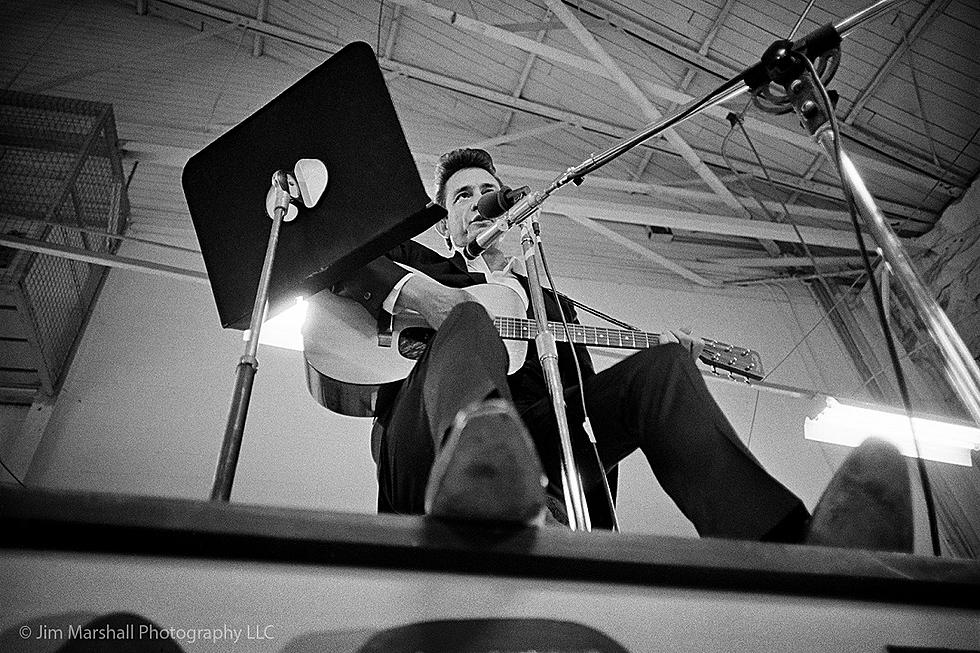
How Johnny Cash’s Prison Shows Solidified His Outlaw Status + Created His Legacy
No artist is more synonymous with the country music genre than Johnny Cash, and no pieces of concept art exemplify the Man in Black's ethos more than his prison concerts: the iconic At Folsom Prison and At San Quentin albums, as well as the lesser-known A Concert Behind Prison Walls at the Tennessee State Prison and På Österåker from Sweden.
Cash never spent more than a drunken night at a time behind bars -- when he was arrested for public intoxication and breaking curfew while picking flowers in Starkville, Miss., for example, a story told in “Starkville City Jail” -- but the power behind his theoretical storytelling could convince many otherwise, especially as heard in the live versions of his songs that were captured across his prison series. Cash connected so deeply to these prisoners because he knew he could easily be one of them if he were to stop working on conquering his demons.
Cash's recorded prison performances set a precedent for American rock music, hovered a magnifying glass over Cash’s political values and solidified a large part of his lasting legacy.
San Quentin, You’ve Been Livin’ Hell to Me
Fifty-one years ago, on Feb. 24, 1969, Cash walked into San Quentin State Prison in California to play an unpaid gig for some of the country’s hardest prisoners, to be recorded for a live LP and filmed for a television special. It was his second show behind bars, after the whirlwind success of 1968's At Folsom Prison, wherein Cash branded himself differently from polished countrypolitan stars, as a gruff outlaw, and redeemed his slipping recording career after a stint with pill addiction.
At Folsom Prison had been recorded in two takes, on a stage in the cafeteria behind Death Row in that California prison, and At San Quentin was recorded in a similar fashion. With help from Sun Records guitar aficionado Carl Perkins, Cash's wife June Carter Cash lending harmonies and the rest of his band backing him, Cash conveyed the feelings of the outcasts and the forgotten in a visceral document of history. Each track on the album, chosen carefully, confronts an aspect of life in prison. He bantered condescendingly to prison guards between songs (it was during this set that the infamous photo of a disgruntled Cash giving the camera the middle finger, which now appears in windows up and down Nashville’s Lower Broadway and across the internet, was taken).
The title track, “San Quentin,” appears twice on the album. Though the double performance was planned, the crowd’s reaction is honest. In fact, that response is how listeners can gauge the gravity of Cash’s connection to these people and his understanding of their experiences. Much like a method actor, he took on the perspective of the incarcerated and funneled it into song so others could see it, too; therefore, it's interesting to note what lines resonate most with the prisoners -- which ones they applauded after, particularly in "San Quentin" and its reprise.
Lines including “San Quentin, I hate every inch of you,” “Do you think I’ll be different when you’re through?” and “May all the world regret you did no good” draw loud approval. Cash may have been the first person from outside the walls of San Quentin to verbalize what was inside of these prisoners’ heads.
Mister Congressman, Why Can't You Understand?
After writing “Folsom Prison Blues” in the early 1960s, prisoners across the country wrote letters asking Cash to play for them; in fact, he played at various prisons before the idea to record his shows was proposed. During these visits, Cash took the time to sit down with the inmates, in metal folding chairs, and hear their horror stories -- everywhere from Arkansas to the West Coast -- of fights, sexual assault and murder.
In pictures taken during the recordings, Cash can be seen reaching out his hands to the prisoners nearest the stage. He had always had a soft spot for the underdogs of society, and never shied away from sharing his opinion and living out his ideology, but his time spent behind prison walls for these performances led him to further dedicate his power to an issue he already believed in: prison reform.
Cash became a media poster child for the social issue during the height of the civil rights era in America. He donated a portion of proceeds from his hit prison albums to reform campaigns, and in 1972, he took his activism directly to the seat of power, testifying in front of the United States Senate Committee on the Judiciary’s subcommittee for prison reform. He also sat down with President Richard Nixon to plead his case.
In his later years, Cash moved his charitable efforts to less-risky endeavors, but he commonly kept in touch with prisoners and visited those near his home in Tennessee.
San Quentin, What Good Do You Think You Do?
In May in 2019, a prisoner died from stab wounds in the high-security prison yard at Folsom State Prison, according to the Sacramento Bee. Currently, the United States incarcerates more people per capita than any other developed country, with 2.3 million people, or 698 out of every 100,000 American citizens, in jail as of 2019. While some legislation has been passed since Cash’s time, the rate of incarceration has only increased. Prison reform is largely still an issue 51 years later, making Cash’s music a still-relevant force in the matter.
As with any music, songs that come from a place of truth have a greater emotional effect on their listeners; its the principle on which country music was founded and has thrived for almost a century. In this way, At San Quentin and At Folsom Prison reverberated through a diverse base of fans, and across generations.
“If I had to point to one record -- if you’ve never heard rock ‘n’ roll in your life, if you’ve never heard country music in your life, go get this record," Cash’s longtime guitar player Marty Stuart once said in a What’s In My Bag? interview at Amoeba Records At Folsom Prison. "If you want the definition of American country music, American rock ‘n’ roll, whatever Americana music is, here it is. If I had to take one record to Heaven with me, it would be that one.”
Cash's prison albums placed him back on the country and pop charts after years of absence. By showing up and playing his songs meaningfully, he set a sonic standard for country music: passion over perfection.
Not only that, the Man in Black saved his career while doing good for others and, unknowingly, created a lasting impact on culture. He captured a reality unseen to many in a raw form that reached the masses -- and still does today.
LOOK: These Photos Go Inside Johnny Cash's Folsom + San Quentin Shows
Unforgettable Johnny Cash Moments
More From Big Cat - WBKT-FM










